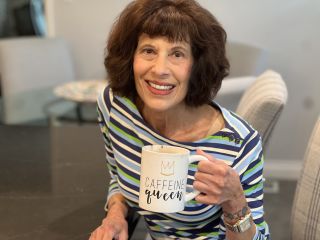Family Dynamics
Coffee-Infused Memories
A Personal Perspective: Coffee is part of the fabric of my being.
Posted May 13, 2024 Reviewed by Devon Frye
Key points
- A family ritual can consist of something as basic as coffee.
- Memories are often created through our senses of smell.
- New legacies are created from childhood memories.
- Our memories can define us in countless ways.
Coffee, as a beverage, but mostly a memory, is part of the fabric of my being—almost genetic in my connection to the powerful beverage. I could live without any specific food or drink but not my morning cup of coffee which must be thick, dark, and rich. Never any milk or sugar added, for as my father reiterated while educating me in all things coffee, “Real coffee drinkers take it black.”
My official coffee education began once my college acceptance letter arrived. “College students drink coffee, so you’ll need to learn to drink it.” My parents had never been to college, and apparently, a substantial intake of caffeine was a major element of my dad’s understanding of university life. I desperately wanted to enjoy what smelled delicious and symbolized my morning familial comfort. This liquid lovingly connected me to Sunday mornings in my childhood home. My father would read the "funnies" (comics) in the newspaper with me on his lap while he sipped his dark, black brew.
Despite the deliciousness of the aroma, I wondered how coffee could taste so vile. My father’s mission consisted of teaching me to appreciate this beverage. One morning, a cup of black coffee sat before me. “We’ll start with sweetening it and little by little, we will remove the sweetener until you can drink it black.”
The sweetener he referred to was saccharine, tiny white dissolvable pills that added imitation sugar to the bitter taste. Of course, in those days, we did not know that in large doses saccharine killed laboratory rats (who knows about humans?). He added 14 (!) saccharine pills, and only then was I able to swallow the acidic liquid.
Dad followed through with his coffee appreciation lessons, and over the course of many weeks, he weened me off the fake sweetener until I became what my father deemed, “a true coffee drinker.” I took my coffee black with no sugar or cream. From that point on, as a newly minted 18-year-old, I became a coffee monster.
As part of my high school graduation gift, my grandmother gave me a 24-inch-long white box with the famous script letter “E” on the front, for the Emporium, a well-known San Francisco department store. As I opened the interestingly shaped gift box and removed the white tissue paper, I uncovered a huge silver metal ten-cup thermos with a red screw top that also served as the cup with a looped handle to use as I drank from it.
My dad, pleased with my grandmother’s coffee-themed gift, added: “Now you can bring hot coffee to the library with you when you study at night.” He had no idea that the rules prohibited coffee drinking in the library, but as his daughter, I found a way around the regulations. How proud he was to be of my caffeine-infused ingenuity!
“But how could I make coffee in my dorm room? “I asked my father. No coffee dilemma was too large for my father. He bought me a metal coil that, when plugged in, would become bright red and I would place it in a cup of cold water until it began to boil. Then, I would add instant coffee to the cup and voila! I had my dorm-room coffee to fill my grandmother’s thermos. Of course, eventually, we were to find out that such coils were fire hazards and banned from dormitory life.
Until I left home as a coffee-drinking college coed, my entire childhood years were framed by the smell of morning coffee. Before my father left for his 10-hour day at the family’s custom shirt store and factory in San Francisco’s financial district, he poured an 8-oz cup of black coffee into a floral mug and lovingly brought it into my mother’s bedroom. At 7:30, she was still slowly waking up under her beige cotton sheets, electric heating pad, and gold bedspread folded at her feet.
Along with her morning cup of Joe, Dad also brought my mother the San Francisco Chronicle. He laid the newspaper on top of her sheets and placed the coffee on the side table next to her bed. “Thank you,” she quietly responded and often closed her eyes again to "doze," as she liked to call it. This was their routine, infused with coffee and caring.
The coffee aroma that permeated my younger years was especially present on Sundays when the Mr. Coffee carafe was filled to its full 12-cup capacity. It was the day I treasured the most when I was a young girl, for it was the only day that my father did not work. Sunday belonged to Daddy, and he joyfully included me. Long after the breakfast dishes were washed, the delicious coffee smell lingered down the hall and into the garage, becoming part of my comforting memory bank. Sunday afternoons, after Sunday School, my father would take me and my best friend Lori on San Francisco excursions.
Every week promised another exploration of the city my father adored: Golden Gate Park’s Stowe Lake, where we rented boats and used oars to move us along the water, or the Japanese Tea Garden, where we could climb up the arched red bridge and slowly down the other side. The SF Zoo along with warm oatmeal cookies, with the butter smudging the wax paper bags that held these sugary treats as we walked eyeing the various caged animals. Lombard Street, the most crooked street in the world, with floral planters dotted along the way as we snaked our way down to the bottom of this street in my father’s gold-colored Buick.
All of these recollections began and ended with my father’s coffee. Coffee before we left for the day and cups when we returned home after dropping Lori back at her house.
Sunday was also when my mother reiterated her infamous mantra: “I hate Sundays; it’s the worst day of the week.” I even began to question myself, as to whether I should dislike this day, but I never could. Sunday was my Funday.
Perhaps what my mother meant, which is so clear to me as an adult, was that her Sundays were filled with loose ends; her daily structure was bent. My father wasn’t at work; my older brother often slept in; my mother had no plan for dinner. It was a jumbled day for her, and she abhorred anything that seemed random and tangled. Monday was so much better for her as she resumed her supine position as my father brought in the morning cup of coffee and newspaper and she could return to sleep after I left for school.
Sadly, our family coffee tradition took on a new routine within a few decades. My dad’s sudden catastrophic stroke disabled the right side of his body and his language, forcing him to be wheelchair-bound for the rest of his life.
So, my mother no longer waited in bed for her morning cup. Rather, she brewed the coffee and served my father, after she had pushed his wheelchair into the side of the kitchen table.
At first, his swallowing was weak, and a thickening agent had to be added to his coffee so he would not choke while drinking. Dad never complained about this new way of drinking his coffee, but it was heartbreaking to watch him slurp his milkshake-like coffee lifted by his only working hand, shaking a little as the mug met his mouth. No more could he teach me how to drink coffee, for he was stoically relearning how to do so himself. Still, the joyful ritual of coffee, despite sadness and limitations, provided an unwritten understanding of our shared love of so much more than the beverage.

The family coffee tradition continues. My oldest son Michael asks me almost weekly if he can bring me an Americano from Peet’s Coffee Shop despite the 25 miles between our homes. My middle son Adam drinks at least 2-3 cups daily and our youngest, Brian, is a cold brew guy. Even Paul, who never was a coffee drinker, now shares in a mutual appreciation for our morning cups.
My father is smiling at yet another part of his legacy started long ago with his introduction of my coffee education. I think he might just accept that one of my sons (and husband) add milk to their coffee appreciating that generations lovingly evolve.




